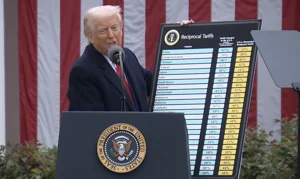Appellate court judges scrutinized President Donald Trump’s tariff authority on Thursday, asking attorneys on both sides of the case tough questions about the president’s authority to restructure global trade without help from Congress.
Trump has used the International Emergency Economic Powers Act to underpin his “Liberation Day” tariffs. On April 2, Trump announced reciprocal tariffs on nearly all U.S. trading partners. He later suspended those higher tariffs but used the threat of higher taxes to get foreign nations to agree to new trade deals. Most of the deals Trump has announced so far come with a 15% import tax on foreign countries, although some face higher rates.
Democrat-led states and five small businesses challenged Trump’s authority under the 1977 law. A lower court tossed the tariffs, saying Trump overstepped. The administration took it to the U.S. Court of Appeals for the Federal Circuit, which heard oral arguments in the case Thursday.
“IEEPA doesn’t even mention the word ‘tariffs’ anywhere,” Circuit Judge Jimmie Reyna said.
Another member of the 11-judge panel, Alan Lourie, who was appointed by George H.W. Bush, said he didn’t see anything similar in the statute.
“There’s an old expression in the law, ‘noscitur a sociis:’ ‘you know it by its friends,’ ” he said. “Tariffs seem to have no friends in that statute.”
Brett Schumate, the Trump administration’s attorney, disputed the assertion, saying Congress had granted the president broad authority to act during an emergency under IEEPA.
Attorney for the small business plaintiffs, Neal Katyal, argued Congress never gave the president such unbounded authority. He said the government was claiming that “the president can do whatever he wants, whenever he wants, for as long as he wants so long as he declares an emergency.”
Oregon Solicitor General Benjamin Gutman, who argued on behalf of the Democrat-led states, said Trump’s view of the 1977 law amounts to a “breathtaking claim to power that no president has asserted in 200 years.”
He added: “The consequences are staggering.”
Trump didn’t attend the hearing but said the tariffs are essential.
“If our Country was not able to protect itself by using TARIFFS AGAINST TARIFFS, WE WOULD BE ‘DEAD,’ WITH NO CHANCE OF SURVIVAL OR SUCCESS,” Trump wrote Thursday in a social media post.
He also said the import duties would make the U.S. wealthy. The U.S. carries more than $36.8 trillion in debt, and Congress hasn’t passed a surplus budget since 2001.
“Tariffs are making America GREAT & RICH Again,” Trump wrote in another post. “They were successfully used against the USA for decades and, coupled with really dumb, pathetic, and crooked politicians, we’re having a devastating impact on the future, and even the survival, of our country. Now the tide has completely turned, and America has successfully countered this onslaught of Tariffs used against it.”
Trump’s efforts to give U.S. companies a home-field advantage mark the most significant overhaul of global trade since the end of World War II.
The closely watched case, brought by Liberty Justice Center, could have significant financial consequences for businesses and states. A tariff is a tax on imported goods paid by the person or company that imports the goods. The importer can absorb the cost of the tariffs or try to pass the cost on to consumers through higher prices.
Phillip Magness, a senior fellow at the Independent Institute, said both sides faced difficult questions about their arguments.
“The court appeared to acknowledge that there are some circumstances where Trump could impose tariffs, but these needed to be done either on a more narrow reading of the ’emergency’ IEEPA statute or, more likely, under other trade statutes with more stringent requirements that Trump has sought to bypass,” he told The Center Square.
Thomas Berry, director of the Cato Institute’s Robert A. Levy Center for Constitutional Studies, said the judges’ questions on Thursday favored the plaintiffs.
“Based on the tenor and questions of the arguments, it appears that the challengers have the better odds of prevailing,” he said.
In May, the three-judge panel on the U.S. Court of International Trade unanimously ruled that Congress did not give the president tariff authority under the International Emergency Economic Powers Act of 1977. The ruling voided Trump’s “Liberation Day” tariffs and struck down other tariffs Trump issued under the IEEPA.
The administration appealed to the Federal Circuit, which ruled that Trump’s “Liberation Day” tariffs could remain in place while the legal challenge continued.
The appeals court didn’t issue a decision from the bench Thursday.
“It is always difficult to predict what a court will do based on a hearing, but the judges did not appear to buy the core of the Trump administration’s most expansive arguments about IEEPA,” Magness said. “This hints that they will likely impose some restrictions on Trump’s use of IEEPA at minimum, or strike down the most sweeping tariff orders under that statute.”
Trump’s attorneys have vowed to appeal the case to the U.S. Supreme Court if the federal appeals court doesn’t rule in the administration’s favor.






